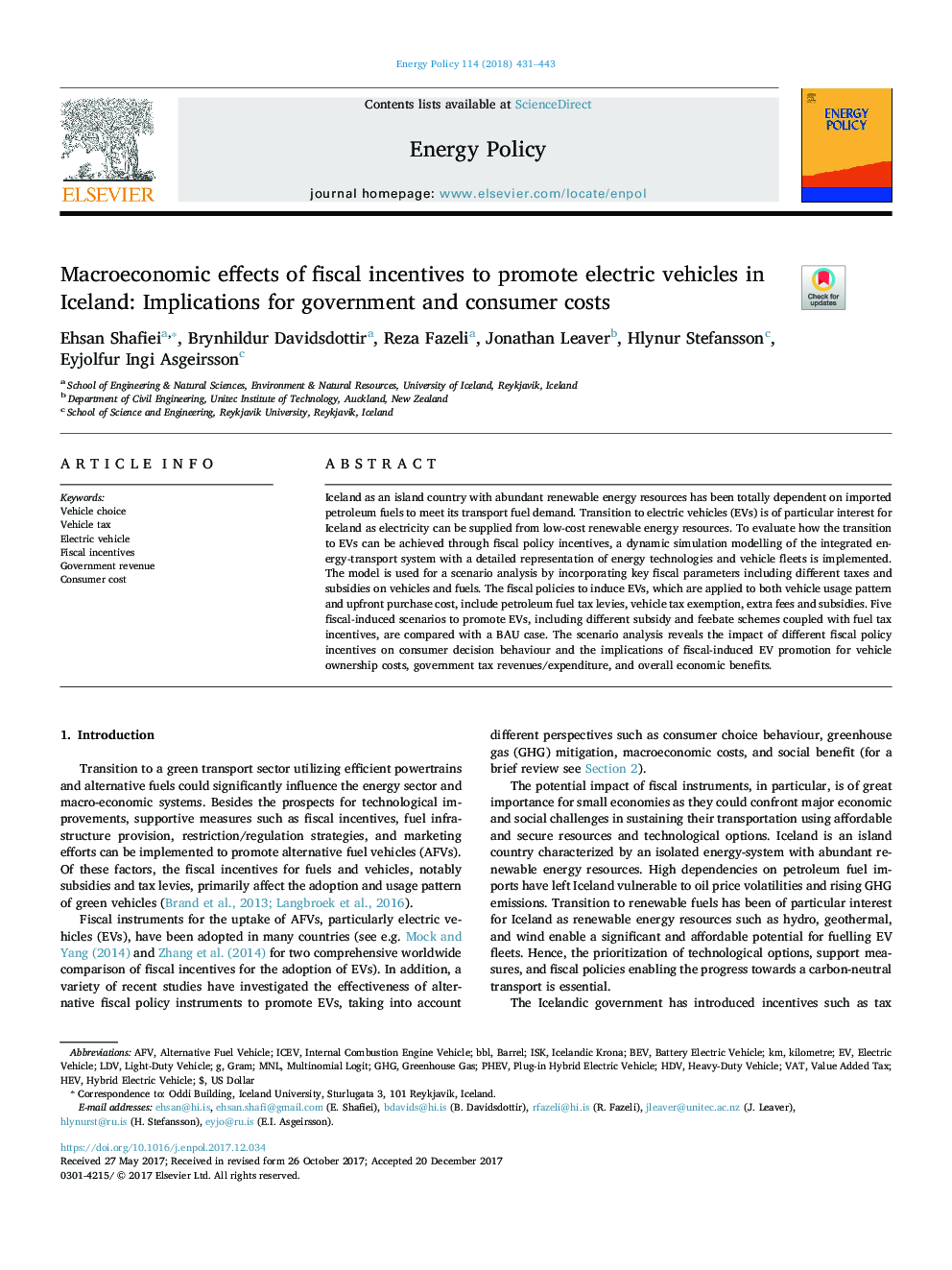| کد مقاله | کد نشریه | سال انتشار | مقاله انگلیسی | نسخه تمام متن |
|---|---|---|---|---|
| 7397779 | 1481244 | 2018 | 13 صفحه PDF | دانلود رایگان |
عنوان انگلیسی مقاله ISI
Macroeconomic effects of fiscal incentives to promote electric vehicles in Iceland: Implications for government and consumer costs
ترجمه فارسی عنوان
اثرات اقتصاد کلان مشوق های مالی برای ترویج وسایل نقلیه الکتریکی در ایسلند: پیامدهای هزینه های دولت و مصرف کننده
دانلود مقاله + سفارش ترجمه
دانلود مقاله ISI انگلیسی
رایگان برای ایرانیان
کلمات کلیدی
MNLGHGHEVPHEVAFVICEVLDVBBLBEVHDVmultinomial logit - logit چندجملهایVehicle choice - انتخاب خودروIsK - ایسکPlug-in Hybrid Electric Vehicle - برق خودرو هیبریدیBarrel - بشکهHybrid electric vehicle - خودرو الکتریکی هیبریدیInternal Combustion Engine Vehicle - خودرو موتور احتراق داخلیElectric Vehicle - خودروالکتریکی Government revenue - درآمد دولتUS dollar - دلار آمریکاValue added tax - مالیات بر ارزش افزودهVAT - مالیات بر ارزش افزودهFiscal incentives - مشوق های مالیBattery electric vehicle - وسیله نقلیه الکتریکی باتریAlternative fuel vehicle - وسیله نقلیه جایگزینLight-duty vehicle - وسیله نقلیه سبکHeavy-duty vehicle - وسیله نقلیه سنگینKilometre - کیلومترGreenhouse gas - گاز گلخانه ایGram - گرام
موضوعات مرتبط
مهندسی و علوم پایه
مهندسی انرژی
مهندسی انرژی و فناوری های برق
چکیده انگلیسی
Iceland as an island country with abundant renewable energy resources has been totally dependent on imported petroleum fuels to meet its transport fuel demand. Transition to electric vehicles (EVs) is of particular interest for Iceland as electricity can be supplied from low-cost renewable energy resources. To evaluate how the transition to EVs can be achieved through fiscal policy incentives, a dynamic simulation modelling of the integrated energy-transport system with a detailed representation of energy technologies and vehicle fleets is implemented. The model is used for a scenario analysis by incorporating key fiscal parameters including different taxes and subsidies on vehicles and fuels. The fiscal policies to induce EVs, which are applied to both vehicle usage pattern and upfront purchase cost, include petroleum fuel tax levies, vehicle tax exemption, extra fees and subsidies. Five fiscal-induced scenarios to promote EVs, including different subsidy and feebate schemes coupled with fuel tax incentives, are compared with a BAU case. The scenario analysis reveals the impact of different fiscal policy incentives on consumer decision behaviour and the implications of fiscal-induced EV promotion for vehicle ownership costs, government tax revenues/expenditure, and overall economic benefits.
ناشر
Database: Elsevier - ScienceDirect (ساینس دایرکت)
Journal: Energy Policy - Volume 114, March 2018, Pages 431-443
Journal: Energy Policy - Volume 114, March 2018, Pages 431-443
نویسندگان
Ehsan Shafiei, Brynhildur Davidsdottir, Reza Fazeli, Jonathan Leaver, Hlynur Stefansson, Eyjolfur Ingi Asgeirsson,
